|
|
|
Sort Order |
|
|
|
Items / Page
|
|
|
|
|
|
|
| Srl | Item |
| 1 |
ID:
133977
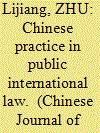

|
|
|
|
|
| Publication |
2014.
|
| Summary/Abstract |
This Survey covers materials reflecting Chinese practice in 2013 relating to: Fundamental Principles of International Law (The Principle of Equality of State Sovereignty; Permanent Sovereignty over Natural Resources; Prohibition of Threat or Use of Force; Peaceful Settlement of International Disputes; Non-intervention in Internal Affairs); Sources of International Law (Identification of Customary International Law; Guide to Practice on Reservations to Treaties; Provisional Application of Treaties); Relationship between International Law and Chinese Law (Act on Administration of Tax Collection Revised; Act on the Prevention and Control of Environmental Pollution by Solid Wastes Revised; Act on Seed Revised; Act on Animal Epidemic Prevention Revised; Act on Trade Mark Revised; Act on Fishery Revised; Act on Marine Environment Protection Revised; Act on Customs Revised); Recognition of New States (Palestine; Kosovo); Jurisdiction and Immunity (Scope and Application of Universal Jurisdiction; Immunity of State Officials from Foreign Criminal Jurisdiction); China's Territorial Integrity (Taiwan; Tibet; China-India Border; Diaoyu Island and its Affiliated Islands; Nansha Islands); Polar Regions (Arctic Council; Antarctic Treaty); International Law of the Sea (Submission to the Commission on the Limits of the Continental Shelf in part of the East China Sea; Commission on the Limits of the Continental Shelf (CLCS); International Seabed Authority (ISA); International Tribunal for the Law of the Sea (ITLOS); Marine Biodiversity beyond Areas of National Jurisdiction; Reorganization of State Ocean Administration); International Air and Space Law (Establishment of Air Defense Identification Zone in East China Sea; Peaceful Use of Outer Space; Transparency and Confidence-Building Measures in Outer Space; International Code of Conduct for Outer Space Activities); International Cyberspace Law (International Code of Conduct for Information Security; Cyber Crime); Aliens (Regulation on Administration of Exit and Entry); International Human Rights Law (Universal Periodic Review; Office of the High Commissioner for Human Rights (OHCHR); International Covenant on Civil and Political Rights (ICCPR); Convention against Torture and Other Cruel Inhuman or Degrading Treatment or Punishment (CAT); Convention on the Rights of the Child (CRC); Human Rights Treaty Bodies and Their Reform; Rights of Indigenous Peoples; Action Plan for Fighting Human Trafficking (2013-2020)); International Humanitarian Law (Protection of Civilians in Armed Conflicts; Protection of Journalists in Armed Conflicts); International Law on Disasters (Protection of Persons in the Event of Disasters); International Law on Arms Control, Disarmament and Non-proliferation (Nuclear Disarmament and Non-Proliferation; Chemical Weapons Convention; Biological Weapons Convention (BWC); Convention on Certain Conventional Weapons (CCW); Amended Protocol II to the CCW; Ottawa Convention; Convention on Cluster Munitions (CCM); Protocol V to the CCW (ERW); Improvised Explosive Devices (IEDs); Lethal Autonomous Robots; Arms Trade Treaty (ATT); Small Arms and Light Weapons; Conference on Disarmament (CD)); International Criminal Law (Crimes against Humanity; International Criminal Court (ICC); ICTY and ICTR; UN Comprehensive Convention against Terrorism; Agreement on the Procedure for Organizing and Conducting Joint Anti-Terrorist Exercises by Member States of the Shanghai Cooperation Organization; Agreement on the Procedure for Organizing and Conducting Joint Anti-Terrorist Operations within Member States of the Shanghai Cooperation Organization; Trafficking in Cultural Property; Ratification of the Treaty on Transfer of the Convicted between the People's Republic of China and the Republic of Kyrgyzstan; International Criminal Judicial Assistance and Police Cooperation); International Environmental Law (Climate Change; Sustainable Development; Protection of Atmosphere; Action Plan on Air Pollutio
|
|
|
|
|
|
|
|
|
|
|
|
|
|
|
|
| 2 |
ID:
185847


|
|
|
|
|
| Summary/Abstract |
The Antarctic Treaty System provides the corpus of law that governs the obligations of its Parties to protect and conserve the Antarctic environment. The System consists principally of the Antarctic Treaty (the Treaty), the Convention on the Conservation of Antarctic Marine Living Resources (CAMLR Convention), and the Protocol on Environmental Protection to the Antarctic Treaty (Environmental Protocol). The Antarctic Treaty establishes the Antarctic Treaty Consultative Meeting – the body that makes decisions under the provisions of the Treaty and Environmental Protocol. The CAMLR Convention establishes the Commission for the Conservation of Antarctic Marine Living Resources (CCAMLR) – its decision-making body. Together, these two international bodies are responsible for the modern-day conservation and environmental management regimes for Antarctica and the Southern Ocean. This paper looks at the scope of law developed under the Antarctic Treaty System and its evolution; and at the interaction between the different components of the Antarctic Treaty System. The paper also forecasts some of the future challenges to conservation and environmental protection in Antarctica and the Southern Ocean.
|
|
|
|
|
|
|
|
|
|
|
|
|
|
|
|
| 3 |
ID:
002565
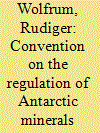

|
|
|
|
|
| Publication |
Berlin, Springer-verlag, 1991.
|
| Description |
205p.
|
| Standard Number |
0387542191
|
|
|
|
|
|
|
|
|
|
|
|
Copies: C:1/I:0,R:0,Q:0
Circulation
| Accession# | Call# | Current Location | Status | Policy | Location |
| 033862 | 341.026/WOL 033862 | Main | On Shelf | General | |
|
|
|
|
| 4 |
ID:
174520
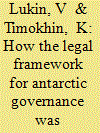

|
|
|
|
|
| Summary/Abstract |
ON DECEMBER 1, 1959, the Antarctic Treaty was signed by Australia, Argentina, Belgium, Great Britain and Northern Ireland, New Zealand, Norway, the Soviet Union, the United States, France, Chile, the Union of South Africa, and Japan. Its founders were the states engaged in scientific research on the sixth continent as part of the 1957-1958 International Geophysical Year (IGY) program. The Antarctic Treaty was the first international legal act to regulate the activities of countries, establish a governance framework and determine the nature of interstate relations in the Southern Polar Region. Drafted at the height of the Cold War, the document became a model for defusing international tension and an example of practical joint effort by states to address global scientific problems. Peace, international cooperation, research, and environmental protection were the fundamental objectives of the Treaty.
|
|
|
|
|
|
|
|
|
|
|
|
|
|
|
|
| 5 |
ID:
106469
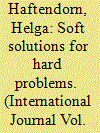

|
|
|
| 6 |
ID:
188465
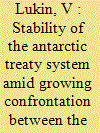

|
|
|
|
|
| Summary/Abstract |
TRANSIENT changes in the modern world order have a significant impact not only on the foreign and domestic policies of individual states, even the most isolated ones, but also on vast geographic regions of our planet. One of them is Antarctica, which occupies about 52.5 million square kilometers, or one-tenth of the Earth's surface, around the South Pole. This area of the planet, which has no state or customs borders and no permanent population, industry, agriculture, transport communications, urban settlements, or military bases, is under international control. This control regime was established by the Antarctic Treaty of December 1, 1959 (hereinafter referred to as the Treaty), and other regional acts of international law included in the Antarctic Treaty System. Despite its uniqueness and natural isolation, Antarctica continues to be influenced by world politics and economics.
|
|
|
|
|
|
|
|
|
|
|
|
|
|
|
|
|
|
|
|
|